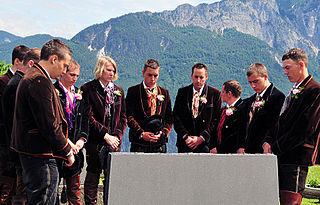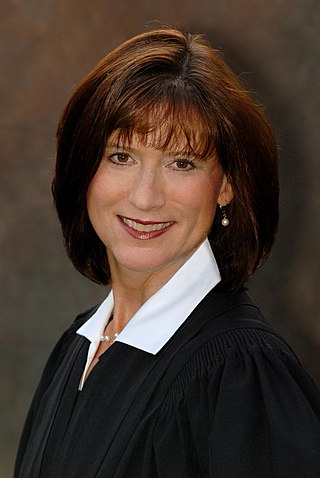Lemon v. Kurtzman, 403 U.S. 602 (1971), was a case argued before the Supreme Court of the United States. The court ruled in an 8–0 decision that Pennsylvania's Nonpublic Elementary and Secondary Education Act from 1968 was unconstitutional and in an 8–1 decision that Rhode Island's 1969 Salary Supplement Act was unconstitutional, violating the Establishment Clause of the First Amendment. The act allowed the Superintendent of Public Schools to reimburse private schools for the salaries of teachers who taught in these private elementary schools from public textbooks and with public instructional materials. Lemon was a major precedent in federal and local courts until it was effectively overturned by Kennedy v. Bremerton School District in 2022.
Wallace v. Jaffree, 472 U.S. 38 (1985), was a United States Supreme Court case deciding on the issue of silent school prayer.

A moment of silence is a period of silent contemplation, prayer, reflection, or meditation. Similar to flying a flag at half-mast, a moment of silence is often a gesture of respect, particularly in mourning for those who have died recently, or as part of a tragic historical event, such as Remembrance Day.
Elk Grove Unified School District v. Newdow, 542 U.S. 1 (2004), was a case decided by the U.S. Supreme Court. The lawsuit, originally filed as Newdow v. United States Congress, Elk Grove Unified School District, et al. in 2000, led to a 2002 ruling by the United States Court of Appeals for the Ninth Circuit that the words "under God" in the Pledge of Allegiance are an endorsement of religion and therefore violate the Establishment Clause of the First Amendment to the United States Constitution. The words had been added by a 1954 act of Congress that changed the phrase "one nation indivisible" into "one nation under God, indivisible". After an initial decision striking the congressionally added "under God", the superseding opinion on denial of rehearing en banc was more limited, holding that compelled recitation of the language by school teachers to students was invalid.
Santa Fe Independent School Dist. v. Doe, 530 U.S. 290 (2000), was a case heard before the United States Supreme Court. It ruled that a policy permitting student-led, student-initiated prayer at high school football games violates the Establishment Clause of the First Amendment. Oral arguments were heard March 29, 2000. The court announced its decision on June 19, holding the policy unconstitutional in a 6–3 decision.
In United States law, the Establishment Clause of the First Amendment to the United States Constitution, together with that Amendment's Free Exercise Clause, form the constitutional right of freedom of religion. The relevant constitutional text is:
Congress shall make no law respecting an establishment of religion...
McCreary County v. American Civil Liberties Union of Kentucky, 545 U.S. 844 (2005), was a case argued before the Supreme Court of the United States on March 2, 2005. At issue was whether the Court should continue to inquire into the purpose behind a religious display and whether evaluation of the government's claim of secular purpose for the religious displays may take evolution into account under an Establishment Clause of the First Amendment analysis.

James Harvie Wilkinson III is an American jurist who serves as a United States circuit judge on the United States Court of Appeals for the Fourth Circuit. His name has been raised at several junctures in the past as a possible nominee to the United States Supreme Court.

William Holcombe Pryor Jr. is an American lawyer who has served as the chief judge of the United States Court of Appeals for the Eleventh Circuit since 2020. He was appointed as a United States circuit judge of the court by President George W. Bush in 2004. He is a former commissioner of the United States Sentencing Commission. Previously, he was the attorney general of Alabama, from 1997 to 2004.

Diane Schwerm Sykes is an American jurist and lawyer who serves as the chief judge of the U.S. Court of Appeals for the Seventh Circuit. She served as a justice of the Wisconsin Supreme Court from 1999 to 2004.
Kenneth Francis Ripple is a Senior United States circuit judge of the United States Court of Appeals for the Seventh Circuit.

Selman v. Cobb County School District, 449 F.3d 1320, was a United States court case in Cobb County, Georgia involving a sticker placed in public school biology textbooks. The sticker was a disclaimer stating that "Evolution is a theory, not a fact, concerning the origin of living things." The plaintiffs were parents of children in Cobb County schools who claimed the sticker violated both the Establishment Clause of the United States Constitution and the separation of church and state clause in the Georgia State Constitution because its purpose and effect was to cast doubt on the scientific consensus regarding evolutionary theory in order to promote religious beliefs in the schools.

Timothy Michael Tymkovich is a United States circuit judge of the United States Court of Appeals for the Tenth Circuit.

Milan Dale Smith Jr. is an American attorney and jurist serving as a United States circuit judge of the United States Court of Appeals for the Ninth Circuit. Smith's brother, Gordon H. Smith, was a Republican U.S. Senator from 1997 to 2009. Milan Smith is neither a Republican nor a Democrat.
Robert David Sack is a senior United States circuit judge of the United States Court of Appeals for the Second Circuit.

David Brookman Smith, known professionally as D. Brooks Smith, is a senior United States circuit judge of the United States Court of Appeals for the Third Circuit. He was previously Chief Judge of both the United States Court of Appeals for the Third Circuit and the United States District Court for the Western District of Pennsylvania, and is the only judge in the history of the Third Circuit to have served as both a chief district judge and chief of the Court of Appeals. Since January 2022, Smith has served as Penn State Law's new jurist in residence.
Matal v. Tam, 582 U.S. 218 (2017) is a Supreme Court of the United States case that affirmed unanimously the judgment of the United States Court of Appeals for the Federal Circuit that the provisions of the Lanham Act prohibiting registration of trademarks that may "disparage" persons, institutions, beliefs, or national symbols with the United States Patent and Trademark Office violated the First Amendment.
Uzuegbunam v. Preczewski, 592 U.S. ___ (2021), is a decision by the Supreme Court of the United States, dealing with nominal damages to be awarded to individuals whose right to freedom of speech has been suppressed by an entity but subsequently rendered moot due to intervening circumstances. In an 8–1 decision, the Court held that such nominal damages satisfy the Article Three requirement of redressability, when awarded for a past violation of a legal rights.
Kennedy v. Bremerton School District, 597 U.S. ___ (2022), is a landmark decision by the United States Supreme Court in which the Court held, 6–3, that the government, while following the Establishment Clause, may not suppress an individual from engaging in personal religious observance, as doing so would violate the Free Speech and Free Exercise Clauses of the First Amendment.








